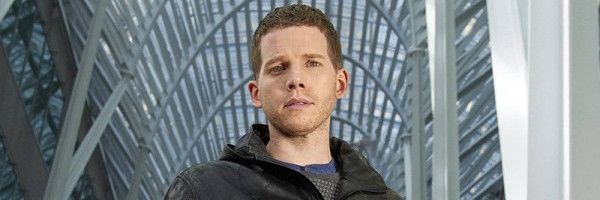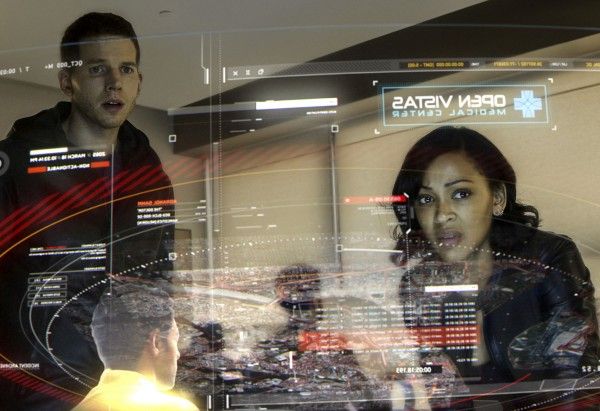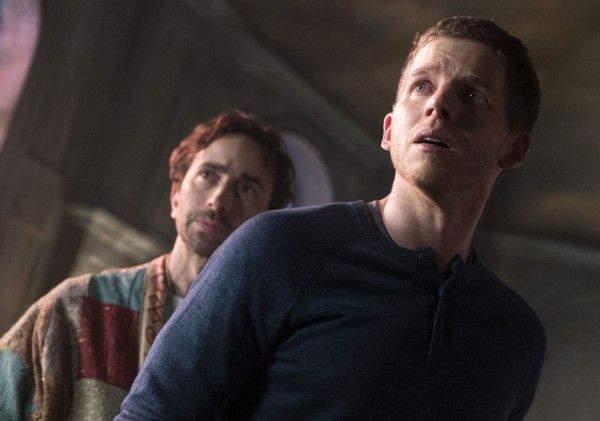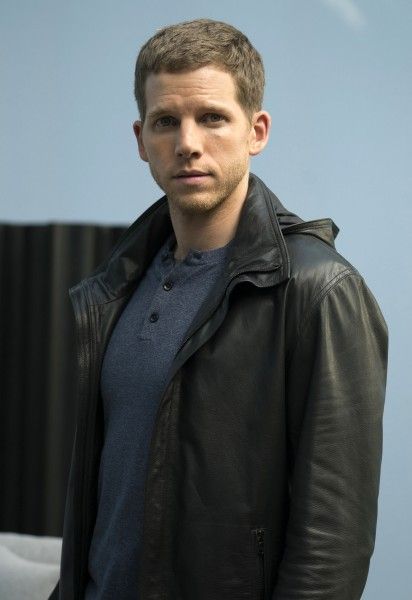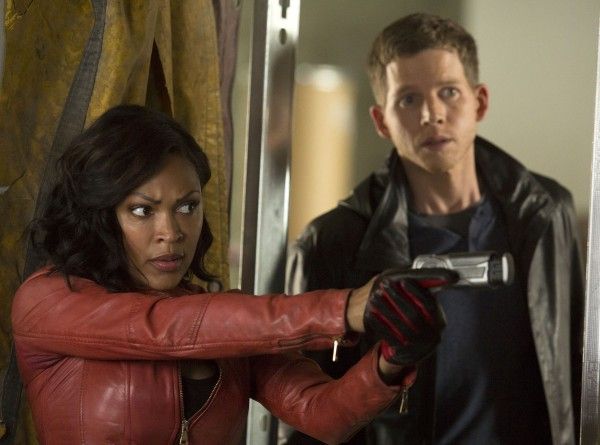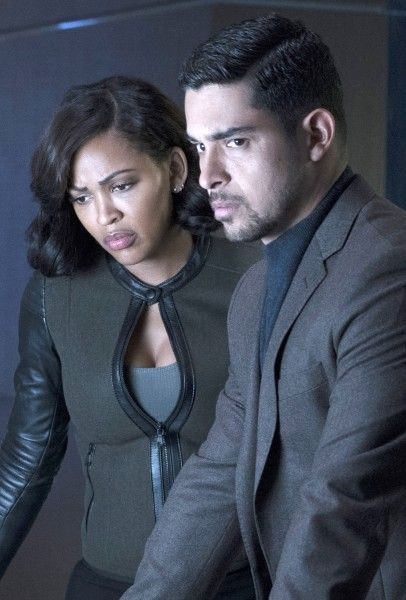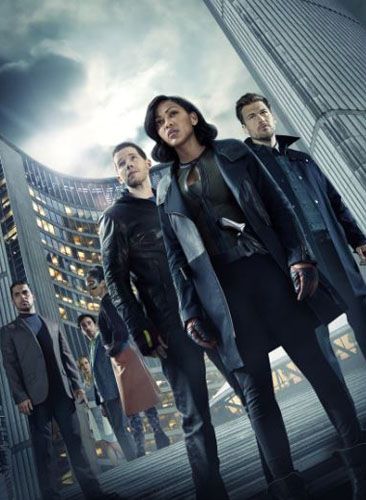Based on the international blockbuster film by executive producer Steven Spielberg, the Fox drama series Minority Report follows the unlikely partnership between Precog Dash (Stark Sands), who is driven by his terrifying but fragmented visions, and police detective Lara Vega (Meagan Good), who attempts to help stop the murders that he predicts. Set in 2065, ten years after the demise of Precrime, a law enforcement agency tasked with identifying and eliminating criminals before their crimes were committed, the two must elude others who will stop at nothing to exploit precognitive abilities.
To learn more about this new show and how it’s both drawing and departing from the movie, Collider chatted with executive producers Max Borenstein (who wrote the pilot), Kevin Falls, Justin Falvey and Darryl Frank, and compiled this list of 21 things to know. Be aware that there are some spoilers.
-
Max Borenstein got involved when he talked to Darryl Frank and Justin Falvey and Amblin, who told him that Steven Spielberg was interested in doing a TV series for Minority Report. He immediately jumped at the chance, but then had to figure out what to pitch.
- Before writing the pilot, Borenstein watched the film, which he hadn’t seen in years but loved. When watching it, he realized that the film tells a full story of the downfall of the Precrime program, which was a flawed system because people can change their futures. But instead of doing a show, week after week, of Precrime, he wanted to follow the Precogs who have to figure out how to live among people, even though they have murder visions.
- Minority Report was a co-production between Fox and DreamWorks. DreamWorks sold its catalog to Paramount, which has a new television production company. They then went to 20th Century Fox Television about doing a Minority Report series, and they went to Spielberg about it.
- Competition breeds quality, so when the cable networks upped their game, in terms of the quality, the broadcast networks got more ambitious. With this, Fox is swinging for the fences, in terms of production value and every level of the aesthetic.
-
This show is a challenge, with the world creation and all of the technology, but it all starts with character. The emotional way into the show from the Precog’s perspective is what makes the show original and makes it work on a fundamental human level.
- According to Frank, they have taken into consideration the fact that many viewers will be coming to this show without having seen the film. The first two acts of the pilot reset what the concept is, and then their main title will do some of that work, after that. It’s a pretty streamlined way into the story, and you won’t feel like you need more information to understand what’s happening.
- This show has to work on two levels, and tell stories that are both driven procedurally and that have continuing mythologies and longer arcs. They think about the big arcs for the season far ahead of time, and are planning for a big cliffhanger in Episode 10, so that there’s something to come back for, after the show has a break. And because of the time period and technology, they can also tell the procedural stories in a different way.
- This show couldn’t have been done, set in 2065, even five years ago. Technology, from an effects standpoint, is progressing rapidly, while TV has gotten more and more ambitious. And because TV is so exciting now, it can draw the best talent, in front of and behind the camera.
-
The biggest thing that played into the changes that have come since the pilot was originally shot were a result of the overall stories they were looking to tell. Borenstein said, “We initially imagined the character of Arthur as being a very slow burn, where we would maybe meet him at the end of the pilot, but not even face to face, and then it would be about finding him. But as we sat down to start writing it, we wanted to have Arthur be a central character and really play up the distinction between Dash and Arthur, personality wise. It became clear that we needed that character in the pilot because he was going to be such a big part of the season. That meant that we could not have one actor play him. He became such a big role that it was impossible. It also meant that, creatively, we could pit the two archetypes together, but that required restructuring.”
- The relationship between Dash, Arthur, Agatha and Vega is always going to be a part of the show, but Season 1 will have a story that is a very large event that the Precogs will have the opportunity to intervene in and stop. However, to do so will put that at very grave risk. Arthur believes that Dash’s responsibility is to himself, and to Arthur and Agatha. But, Dash believes that people are worth saving because he’s an optimist and a humanist. They must figure out how they can work together to help without being thrown into a worse scenario.
- When it came to casting an actor for Dash, Falvey said, “Imagine somebody having spent 10 years in a milk bath. The formative years of development were essentially taken away from this kid. So, you’re trying to find somebody who can capture an innocence and vulnerability, but also have an open mind in recognizing that they’ve got their life ahead of them. And Stark [Sands] is such a talent actor who has all of those things. What’s going to be fun about that character is seeing him become a man, become more confident, and have a better understanding of how people socialize.”
-
Dash and Arthur, played by Nick Zano, are not polar opposites, but they represent two sides of a coin, so Arthur needed a little more confidence, charm and swagger, and wasn’t burdened with the emotional baggage that Dash has. Arthur only gets the names and some of the facts and figures of the individuals, so he’s not as damaged as Dash. It’s easier for him to operate in the world, so he’s taking advantage of it.
- Agatha is the most powerful of the three, and she’s a maternal figure to Dash. Dash gets the visions and Arthur gets the names and numbers, but Agatha sees it all. She’ll play a very big role in the series, but she’s a more mysterious character throughout. They often need all of their knowledge to solve specific cases.
- For the role of Vega, played by Meagan Good, they wanted to find someone who was believable as a cop and who could go toe-to-toe with all of her superiors. She’s a tough woman, who’s single-minded and independent. She represents female empowerment in 2065.
- When it comes to the dynamic of Dash and Vega, the viewers can expect a little bit of teacher-student, and a little bit of nurturing. They are truly partners in crime and there’s an incredible trust because there’s a lot at stake for both of them, in terms of being found out. There’s the burden of responsibility to stop the next victim from getting murdered.
- Blake, played by Wilmer Valderrama, is no dummy and got promoted because he’s good at his job. He knows that Vega is up to something and he knows that she’s got an informant, so he wonders exactly what’s going on. Blake and Vega had a past relationship, but now he’s her boss, which creates some tension there. It will be about at what point Vega and Dash can take him into their confidence, and what implications that will have.
-
According to Borenstein, when it comes to the technology aspect, they’re trying to get as close to what could be as possible. “What Steven Spielberg did with the film was to convene a panel of expert scientists. He didn’t give them one specific change about the future. He just asked what it was going to look like in their different fields, 50 years from now. Those things came into being much sooner than 50 years, but that’s great. That’s the fun part. We hope to come up with things that, in five years, come in. It’s all about trying to come up with something that’s a pushed version of whatever that cutting edge is. Overall, it’s all about technology that speaks to the way we live.”
- Falvey said that pilot director Mark Mylod was always on their short list. They’ve gone to him with multiple projects in the past, and he’s very choosy, but he really responded to the material. He’s exceptional at what he does because he understands the balance between character work and world creation, and he never loses the fundamentals of storytelling. They also have Greg Beeman as their producing director on the series.
- Along with director and writer, the other two hires that were very important to the show were the cinematographer and the production designer. The cinematographer is David Franco, who’s worked on Game of Thrones, and the production designer is Dan Bishop, who also did Mad Men.
- There’s a show bible with every facet of this world, including policing, military and health, so that they have all of that background to choose from. One of the pieces of technology they created for the pilot is a selfie drone that goes up and takes pictures from above. They’re not doing the blue look of the movie. They want it to be a more inviting, relatable and accessible future.
- There are nods to the film, and all sorts of Easter eggs in the series. In the pilot, a TV is showing the 75th anniversary of The Simpsons because that’s still on the air. They also have their own version of Tinder. When it comes to characters, Daniel London will reprise his role as Wally. And there are at least two other characters from the film that are in outlines, but they haven’t gone out to the actors yet.
Minority Report airs on Monday nights on Fox, starting September 21st.

